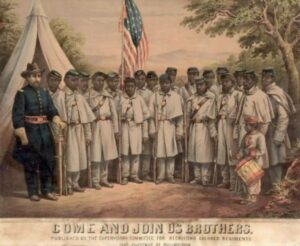During the Civil War, Iowa pulled together an African American regiment that originally was known as the First Iowa Infantry (Colored), and later, redesignated as the 60th U.S. Colored Infantry. The war’s first few years did not see the political will to recruit Black Iowans. However, a few Iowan progressive politicians leveraged the success of Black units from other states, and pressed upon the importance of fulfilling the state’s troop quota for the war.
In May 1863, slaves from northern Missouri and African Americans in southern Iowa were recruited and brought to Keokuk, Iowa, in October of that year. These recruits would spend the majority of the war in Arkansas serving on occupation/anti-guerilla duties. Unfortunately, their base in Helena, Arkansas, was so unpleasant and disease-ridden that it was nicknamed “Hell-in-Arkansas.” More than 300 men died from disease at this base — about a third of the regiment.
The unit’s most substantial combat occurred in July 1864 when a reconnaissance-in-force was cut off from Helena by a group five times their size. These troops managed to hold their position at a railroad embankment on the strength of canister and infield fire until the 15th Illinois Cavalry distracted raiders and permitted an organized withdrawal of the Confederates.
At the time, the Confederates had the policy to send any captured Black troops into slavery rather than keep them as prisoners of war. This made the Black regiments and the 60th even more determined to stand their ground and avoid capture.
The failed Confederate plan was to draw Union soldiers out to be destroyed in the field, which would then allow Confederates to cross the Mississippi and form an attack in Missouri.
A few members of the 60th Infantry did come from Davenport, but their real tie with Camp McClellan was not forged until the post-war period. For a short time after the war, there was a substantial effort for African American men to gain the right to vote. The push for women’s rights still was largely dormant at this time.
On October 31, 1865, 700 veterans held a “Convention of Colored Iowa Soldiers” at Camp McClellan to advocate for their voting rights. Iowa Governor William Stone agreed that African American veterans had earned the right, and a resolution passed the next year. In 1868, through a referendum, Iowa became the only northern state where voters chose to extend voting rights to Black men.


